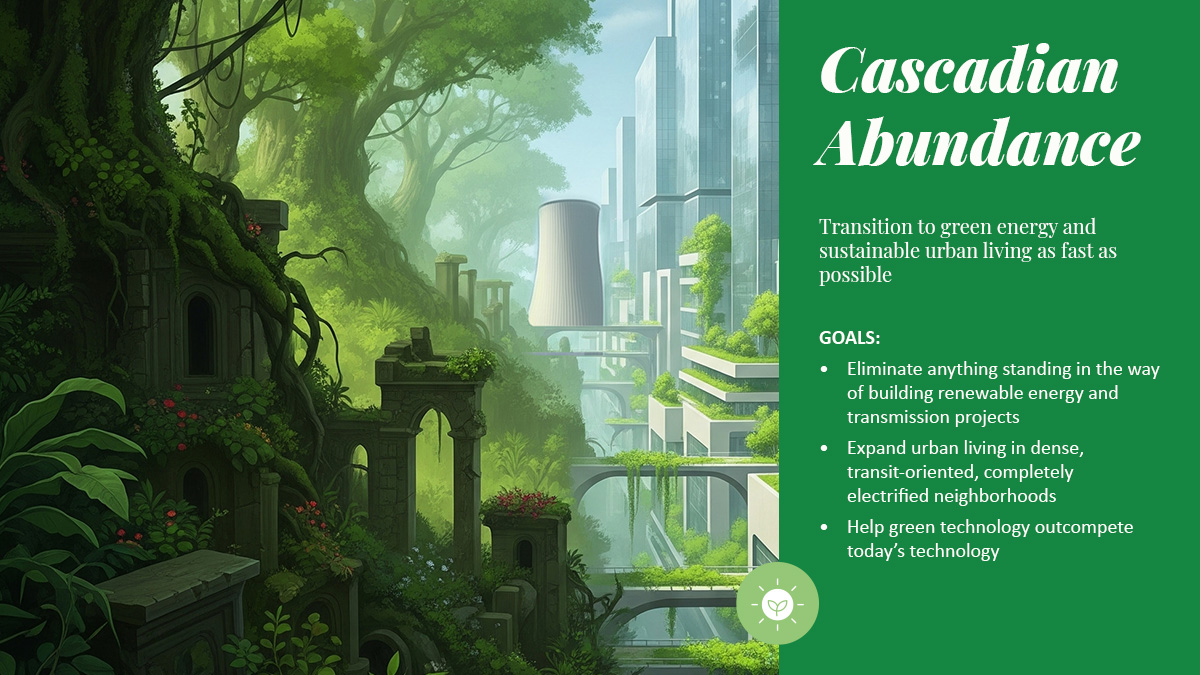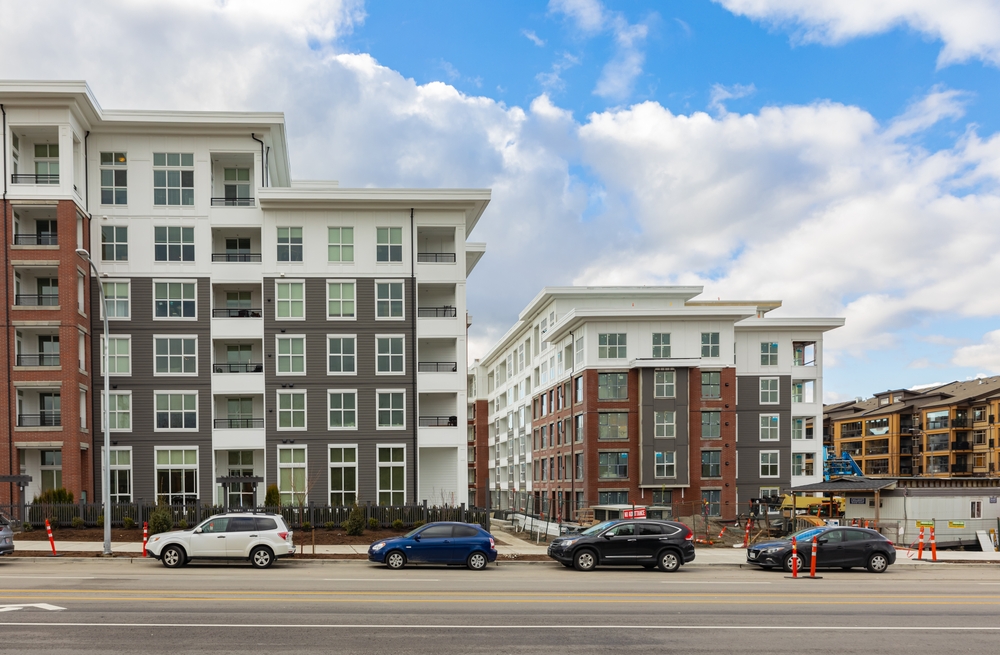NEW PAPER and THREAD: “Defunding the police” does not enjoy broad public support in Black communities.
Most voters prefer reform (community groups, a larger social safety net, and limits on police violence) over abolishment. 1/ niskanencenter.org/reconstructing…
Most voters prefer reform (community groups, a larger social safety net, and limits on police violence) over abolishment. 1/ niskanencenter.org/reconstructing…
First, some history. It’s been common to portray African Americans as passive victims of policies. This downplays the intentionality and purpose behind Black leaders’ long struggle for public safety in their communities in the ‘80s and ‘90s. 2/
Here’s a chart of the crime wave, which rose in the ‘60s and ‘70s, stalled in the ‘80s, and peaked again in 1991 before declining. The black community was hit hard, and calls for more policing and more punitive justice were bipartisan and crossed racial lines. 3/ 

These policies would have disastrous consequences for the black community, thanks to prejudice and discrimination directed specifically at young black men. But in the early ‘90s, public safety and crime reduction were of top concern. 4/
Though less punitive than whites and aware of the racist elements of the criminal justice system, many African Americans nevertheless supported “get tough” strategies. 5/ 
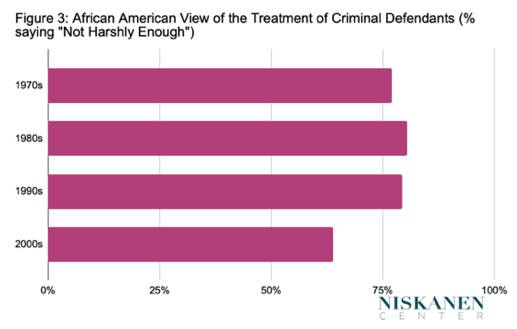
Michael Fortner: “This history is critical to unpacking the politics of 'defund the police'...it reveals the degree to which African Americans embraced policing/punishment as public safety strategies — views that will later constrain the political possibilities of abolition.” 6/
As crime began to fall in the late ‘90s and 2000s, Americans became less punitive. The emphasis went from law and order to criminal justice reform, as the discriminatory nature of law enforcement became apparent. 7/ 
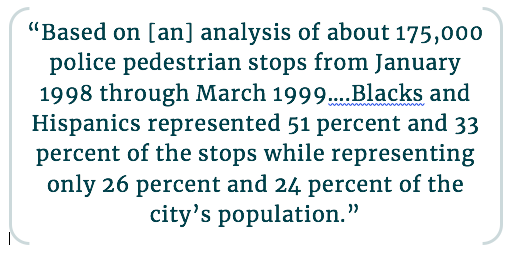
After undercover police officers brutally murdered Sean Bell, an unarmed Black man, polling reflected the Black voters’ complicated attitudes toward the police, with the majority considering law enforcement neither friends nor enemies. 8/ 
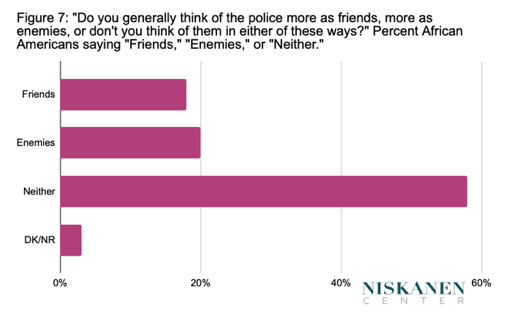
After the senseless murder of Trayvon Martin, #Blacklivesmatter “sought to intervene when violence was inflicted on Black communities by the state and vigilantes.” But #BLM operated independently of the Black community’s old guard leaders. 9/
In the early days of BLM, polling of Black voters showed that while they thought that police violence was a serious problem and believed that Blacks were treated unfairly, they valued policing. 10/ 
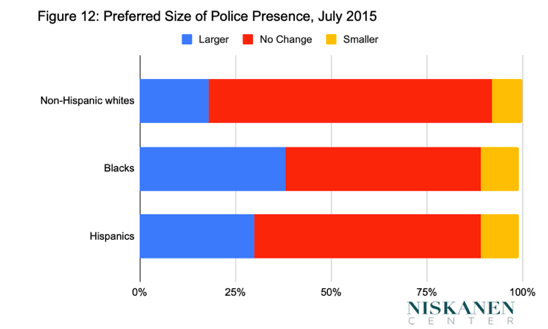
A 2015 Gallup poll showed that 10% of Black respondents wanted a smaller police presence, while 38% wanted more of a presence. 11/
Polling also revealed a generational divide: Most African Americans viewed policing as an indispensable public good that enhanced their quality of life and saved Black lives, while a new generation of Black activists considered it a persistent source of Black death. 12/
It was only after George Floyd’s murder that the idea of “defund the police” emerged. However, polling still indicates that a minority of African Americans seek to abolish the police. A majority of Black voters still prefer police reform. 13/
The difference between this year and previous years is that a youthful minority among young Blacks and whites is increasingly independent and assertive and allied with a rising network of left-of-center organizations and movements. 14/
The killings of Ahmaud Arbery, Breonna Taylor, and Floyd united Black voters of all generations that change of some sort is needed. Polls (@catoinstitute below) demonstrate that there’s consensus around some reform ideas (banning no-knock warrants), but not others 15/ 

There also seems to be confusion around the word “defund,” with a majority Blacks seeing it as changing the way police operate vs. abolishing the police entirely. Once again, those most in favor of abolition are Black and white millennials. 16/ 
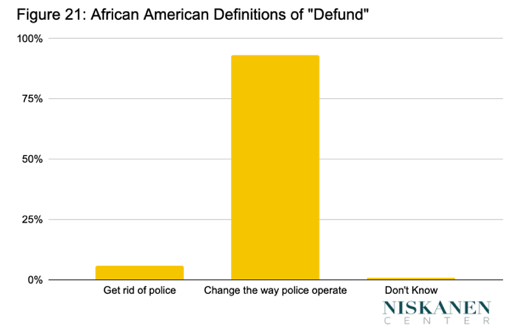
Actual debates over defunding the police have also grown contentious in cities like Minneapolis, Atlanta, and NYC. In NYC, it was mostly white progressives and Latino council members who supported abolishing the police. 17/
Black and Hispanic council members from poor and middle-class neighborhoods sought “a measured approach to cutting the police budget,” and opposed abolishment of the police force. 18/
Racial generalizations obscure real needs and opinions, including generational divides and individual experiences.
It’s a mistake to ignore public opinion and the subtle forces that might shape it, and to push an untried solution on communities that don’t want it. 19/
It’s a mistake to ignore public opinion and the subtle forces that might shape it, and to push an untried solution on communities that don’t want it. 19/
So where do we go from here? Fortner notes, “Most Americans reject the false choice between ‘defund’ and violent, racist policing.”
Reform is needed. Americans want to end chokeholds, strangleholds, no-knock warrants, implementation of de-escalation techniques, etc. 20/
Reform is needed. Americans want to end chokeholds, strangleholds, no-knock warrants, implementation of de-escalation techniques, etc. 20/
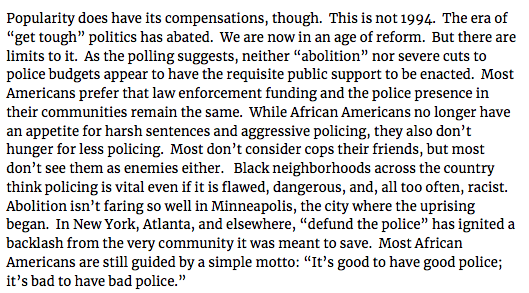
Curbing police unions’ influence and introducing public records that show the use of force, police misconduct, and civilian complaints about officers is also popular. 21/ 
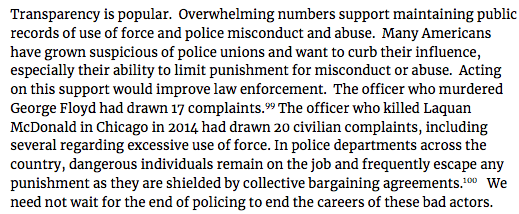
Fortner notes that “Most Americans, especially Blacks, see room for community groups and non-law enforcement professionals, such as social workers and doctors, in a broader public safety strategy.” 22/ 
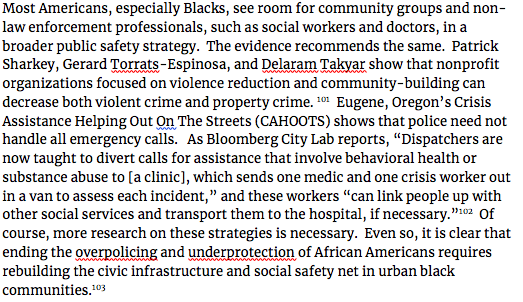
It is clear that ending the overpolicing and underprotection of African Americans requires rebuilding the civic infrastructure and social safety net in urban black communities. 23/
Reforms like these won’t be easy to implement...they’ll require leadership, negotiation, etc. But a deep dive of public opinion reveals that they are wanted by the communities most affected. We should seize this opportunity to save lives and achieve justice. 24/24
Would love to see what @jenniferdoleac, @mattyglesias, and @radleybalko think of Fortner's perspective and approach to police reform.
• • •
Missing some Tweet in this thread? You can try to
force a refresh




